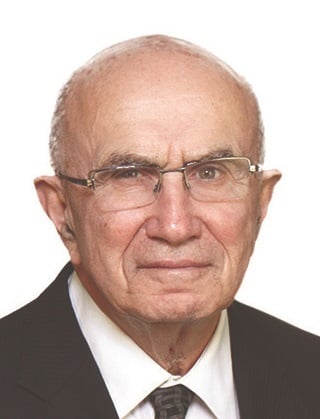Earl Cherniak may be 84, but his war stories are up-to-date. Take the case of Joe Groia, for instance. Groia retained Cherniak in 2009 and they stuck with it until 2018 when the Supreme Court of Canada decision in Groia v. Law Society of Upper Canada vindicated Groia. The SCC set aside a 2012 Law Society of Ontario hearing panel decision and a 2013 LSO appeal panel finding that Groia displayed “incivility” during the insider-trading trial of a former Bre-X Minerals geologist before the Ontario Securities Commission, upheld by a 2015 Divisional Court decision and a 2017 Court of Appeal ruling. Groia and Cherniak went the distance, in other words.
One can conclude that, for clients, there are so many good reasons to retain Cherniak, that the issue of his age doesn’t come up.
Cherniak exudes the Oxford Dictionary definition of indefatigable, “persisting tirelessly” when it came to acting on Groia. Whether he personally ever tires or not, who knows; there is certainly no sign of it. Asked about the significance of Groia, Cherniak said: “It’s been cited many times. It’s a huge disincentive for law societies to take on similar claims. I couldn’t understand why they did it in the first place, especially when the initial basis to proceed was a newspaper report.”
None of this is to suggest that Cherniak is unreasonable. On behalf of his client, Cherniak tried to settle the case before heading to court. But once he began down that road with Groia, there was no being defeated by defeats, as it were. “It’s what I do,” he said plainly.
Cherniak explained the Groia decision in more detail to the Advocate Daily at the time: The decision “maintains the jurisdiction of the law society to deal with these cases — that’s an argument we lost — but if you look at paragraphs 71 to 76 you will see the analysis Justice Moldaver goes through as to the importance of balancing the obligation of civility with the obligation to resolutely and fearlessly defend your client, particularly but not limited to a criminal case.
“Although the SCC majority took no issue with the appeal panel’s approach to incivility — in particular, when a lawyer’s courtroom conduct warrants a finding of professional misconduct — it says the panel ‘unreasonably found Mr. Groia guilty of professional misconduct,’ awarding costs to Groia in this matter, the courts below and for the proceedings before the law society.”
Cherniak’s family members turned up to watch him in the SCC on Groia, but that did not mean the case was Cherniak’s SCC swan song. In fact, he joined the Lerners LLP team in October, representing Mr. Submarine Inc. franchisees against Maple Leaf Foods Inc. and Maple Leaf Consumer Foods Inc. (1688782 Ontario Inc. v. Maple Leaf Foods Inc., et al.).
Somewhat ironically, and most definitely a testament to his position in the Ontario legal lodge, Cherniak himself had been a Law Society bencher until two years before he began on Groia. And in recognition of his accomplishments and contributions to clients and the profession, it awarded him an honorary LLD in June 2019.
By dint of experience, he has watched the seismic changes facing the profession, espoused his own view of them (“I still call it the Law Society of Upper Canada”) and continued doing what he does. He is justly proud of Lerners’ record on pro bono, as well as on diversity and inclusion in hiring.
He remembers when Lerners hired Janet Stewart in 1969; at the time, it was pioneering to hire a woman lawyer. Still, the senior partner said he was going to call her Miss Stewart; Cherniak said he would call her Janet. Now half of the firm’s lawyers are women.
Of his own pro bono activities, he mentions representing “a group of senators on Chaoulli.” (Chaoulli v Quebec (AG) [2005] 1 S.C.R. 791, 2005 SCC 35, in which the SC held that the Quebec Health Insurance Act and the Hospital Insurance Act prohibiting private medical insurance in the face of long wait times violated the Quebec Charter of Human Rights and Freedoms.) In an Osgoode Hall Law Journal article, “The Last Line of Defence for Citizens: Litigating Private Health Insurance in Chaoulli v. Quebec,” Christopher P. Manfredi and Antonia Maioni, after discussing other counsels’ arguments, wrote, “With somewhat more nuance, Earl Cherniak, representing the Kirby Committee, agreed that the health care system was in dire straits, but also insisted that there was a constitutional obligation for governments to deliver necessary services to their residents, preferably through a ‘health care guarantee’ enforced by the federal government.”
Still, even Cherniak cannot argue that the challenges facing the profession will be easily solved. Cherniak addressed the LSO Convocation in Toronto on being awarded the LLD: He reflected on the change to the profession over the 59 years that he has practised thus far; and he compares it with the changes for the 59 years before that.
Here is an excerpt from that address:
I have been an active, practising member of this society for 59 years almost to the day, since my call to the bar in June 1960. I have never regretted for a moment the career I chose. It has rewarded me in every possible way, and still does.
Had a person my equivalent in years of call been given an honorary degree at my Law Society Convocation 59 years ago at the old armouries on University Avenue, he (and it would have been a he) would have been called to the bar in 1901. That observation forms the theme of what I want to say, in the few minutes allotted to me to address you.
Had that man called to the bar in 1901 thought about it at that 1960 Convocation, he would have concluded that the bar that he was still a member of in 1960 had not changed much in 59 years.
To be sure, the world was very different in 1960 than it had been, but the practice of law was not much different at all. There were only 5,000 lawyers in Ontario in 1960, virtually no women and no female judges. The bar was still almost entirely made up of a homogeneous group of white male lawyers, predominately Protestant and Catholic and some Jews.
There was no Charter of Rights, civil and criminal trials took one or two days at most, and even murder trials rarely took more than one week in 1901, and in 1960. The only ground for divorce was adultery, deserted wives had virtually no rights, there was no internet, no Google, no specialization, no messaging, no photocopy, no fax, no email, no voicemail, no class actions and almost no one docketed hours. A large firm, and there were only a few of them, was composed of about 25 lawyers. Most firms had one to 10 lawyers. The one I joined had five. I still practise at that firm, but it numbers almost 130.
Fast forward to 2019. There are 50,000 plus lawyers in Ontario and counting, some firms number up to 1,000 lawyers or more, more than 50% of law school students are female and it won’t be long before that percentage is the same in the profession generally. There is a wide mix of ethnicity in the bar, growing wider all the time. Just look around you.
Practically the only constant in the practice of law from 1960 to now is that we still owe allegiance to the Queen, the black gowns we wear, and Osgoode Hall. Though predicting the future is a mug’s game, I will venture a prediction: The changes you will experience during the course of your practice will make the many changes in my generation pale by comparison.
As Hamlet said to his friend Horatio, “There are more things in Heaven and Earth than are dreamt of in your philosophy.” More “things” are coming, they will not be dreams, and meeting the challenges will require more than philosophy.
I have no more idea of what is coming for you than I did for me in 1960. But come they will.
There are some visible trends; to list just a few:
- 50% of the people on the planet are online
- artificial intelligence is here
- political upheaval is almost everywhere
- climate change and its effects
- space travel and space law
- automated dispute resolution
- outsourcing of much legal work to the developing world
- global law firms on the rise
- increasing self representation, as lawyers become even more unaffordable for many people and much else that is as unknown to us in 2019 as the changes that were coming were unknown in 1960.
Some of you will go into private practice, some to government, some to industry, some to academia, some to politics and some will use your legal skills in a myriad of other ways. Few of you will stay in one field or one firm. There are so many options. There are future judges among you, and perhaps even a future Chief Justice.
You will have to adapt, as my generation did, to the changes that are coming. Much that you learned in law school will become irrelevant. But the analytical skills and the friends you have made will be essential to your professional survival.
My message to you is a simple one.
Change must not be fought. Rather, it is to be welcomed, embraced, accommodated, managed, directed and massaged, so that the changes are for the better and not the worse. That will take some doing and constant vigilance. But if maintenance of the Rule of Law and the values we have as Canadians are the touchstones, it can be done.
From the privileged position that you hold by entering this profession, you all have the capacity, and indeed the obligation, to see that the values that have made Canada the country that it is are maintained, and challenges to these values steadfastly opposed, come what may.
German Chancellor Angela Merkel put it well, when she spoke recently at a Harvard commencement ceremony. She said, “Democracy (and I would add the Rule of Law) cannot be taken for granted. But neither should people assume they are powerless,”
So, I say to you: You are not powerless. Make the most of what you have been given. Make our chosen profession stronger and better, for yourself, your children, your grandchildren, the public that we are sworn to serve, and the country we love.





